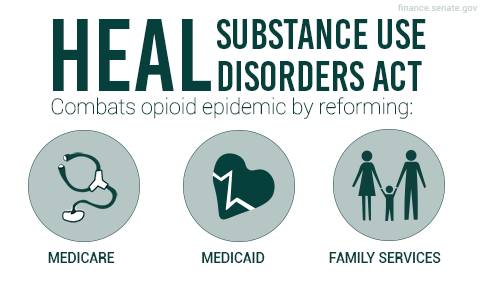Press Contact:
Katie Niederee and Julia Lawless, 202-224-4515
Senate Finance Committee’s HEAL Act, A Critical Step Toward Tackling the Opioid Crisis
Fast Facts About the Bipartisan Legislation to Address the Nation’s Opioid Epidemic

The Senate Finance Committee came together this week to advance the bipartisan Helping to End Addiction and Lessen (HEAL) Substance Use Disorders Act of 2018. HEAL is an important step toward addressing the nation’s opioid crisis through reforming Medicare, Medicaid and family services programs.
Here’s a look at the top policy recommendations from members of the Senate Finance Committee:
MEDICARE
-
Opioid safety education: Develop resources to increase awareness and improve dialogue on opioid use and pain management treatments.
-
Treatment response: Expand access to treatment services through payment changes that increase the availability of telehealth and treatment in other settings.
-
Comprehensive senior screening: Ensure that screenings for seniors assess pain severity, provide non-opioid treatment information, and evaluate for potential substance use disorders with referrals for treatment.
-
Facilitate data sharing: Strengthen partnerships between Medicare contractors through increased data sharing and reporting of suspicious provider activities, as well as identification of seniors who have been treated for an overdose.
-
Opioid prescriber accountability: Establish a program that notifies Part D opioid prescribers identified as outliers to improve prescribing consistent with medical evidence to improve accountability and safety for seniors.
-
Prescription tracking: Increase electronic transmissions of prescriptions and supporting medical documentation to reduce inappropriate use while helping seniors promptly get the drugs they need.
MEDICAID
-
Support moms and babies: Provide recovery care at hospitals or residential pediatric recovery centers for babies born suffering from opioid withdrawal, and support moms with prenatal and postpartum care.
-
Improve peer support: Enhance and increase evaluation of peer support services by recommending legislative and administrative actions that will improve access.
-
Telehealth treatment: Evaluate and strengthen telehealth services including remote patient monitoring, as well as clarifying state reimbursement opportunities for substance use disorder services and treatment using telehealth.
-
Non-opioid treatment options: Enhance patient access to non-opioid treatment and pain management options by ensuring states know what treatments and services are available.
-
Substance use disorder treatment: Require the study and assessment of barriers that limit patient access to substance use disorder treatment medications, in particular, buprenorphine, naltrexone, and buprenorphine-naltrexone combination products.
-
Data sharing improvements: Boost data sharing by clarifying that state Medicaid programs can access state-administered prescription drug monitoring program databases (PDMP) to share the information with Medicaid providers and Medicaid managed care entities.
FAMILY SERVICES
-
Family-focused recovery: Keep families together by providing funding to support programs that help parents complete treatment and reunite with their children more quickly.
-
Expand family-focused residential treatment: Provide grants to public and private entities to develop, enhance or evaluate family-focused residential treatment programs to increase the availability of programs that meet the evidence-based criteria established by the Family First Prevention Services Act so more high-quality programs will qualify for funding.
###
Next Article Previous Article
